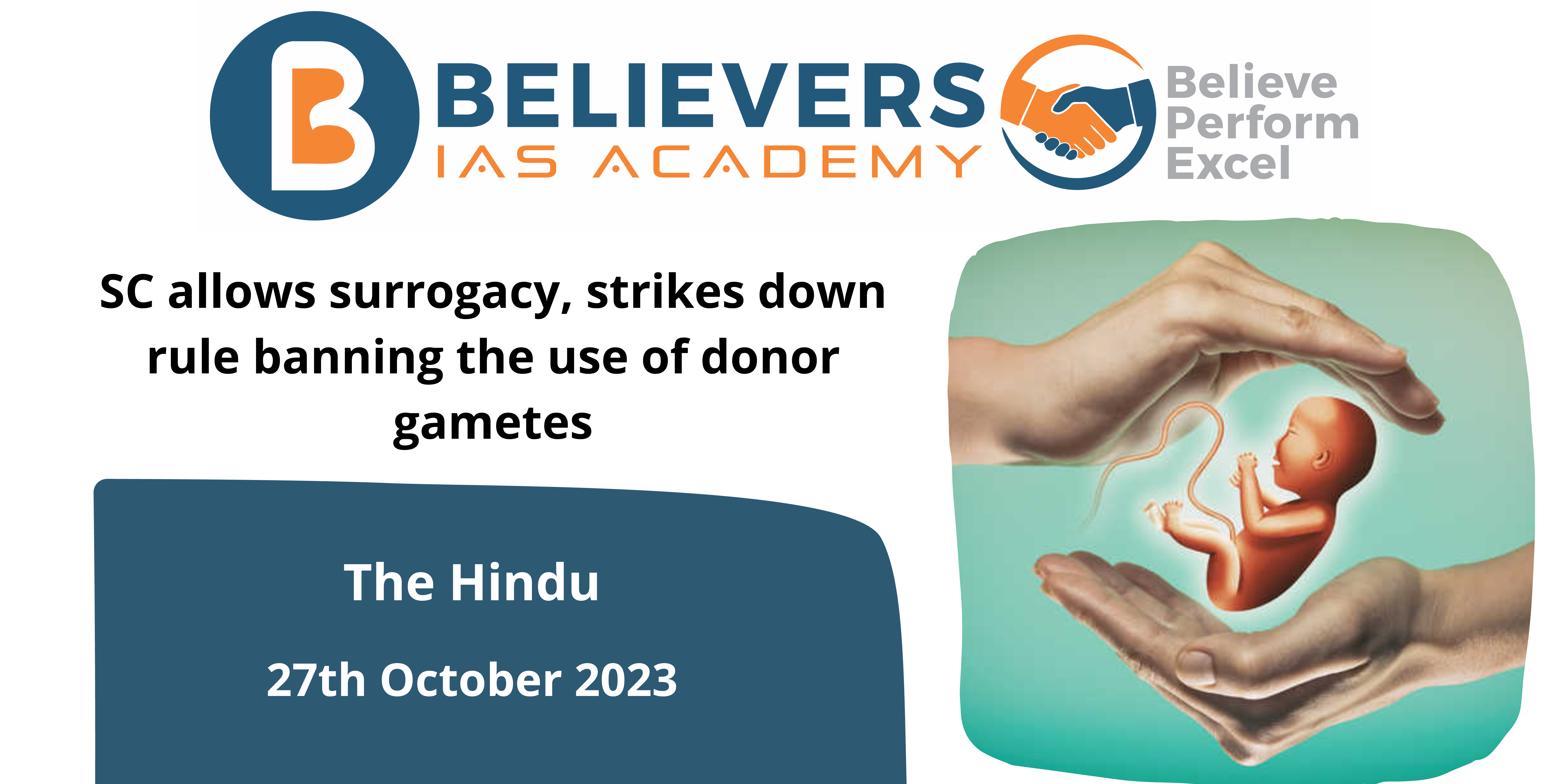SC allows surrogacy, strikes down rule banning the use of donor gametes
Context
The Supreme Court has protected a woman’s right to parenting despite her suffering from a unique physical ailment by halting the implementation of a statute that threatened to derail her ambitions of becoming a mother through surrogacy.
What is the Surrogacy Bill 2021?
- The Surrogacy (Regulation) Act, 2021 is an Indian law that governs and promotes surrogacy. The statute is intended to safeguard the rights and interests of all parties involved.
What are the provisions for the surrogacy Bill?
- Eligibility Requirements:
- The Act allows a woman who is a widow or divorcee between the ages of 35 and 45 to use surrogacy if she has a medical condition that requires it.
- Legally married women and men with a medical condition that requires surrogacy are also eligible.
- Commercial Surrogacy Ban:
- Commercial surrogacy is illegal under the Act and is punishable by up to ten years in prison and a fine of up to Rs ten lakhs.
- Altruistic Surrogacy:
- The legislation only allows altruistic surrogacy, in which no money is exchanged between the surrogate mother and the intended parents.
- The surrogate mother in altruistic surrogacy is genetically connected to those seeking a child.
Who is eligible for surrogacy?
- A widowed or divorced woman between the ages of 35 and 45, or a lawfully married couple
- The surrogate should be married and have her child.
- Infertile Indian couples must be legally married.
- The husband must be between the ages of 26 and 55, while the wife must be between the ages of 23 and 50.
Why did the Supreme Court strike down the rule for one case?
- The woman in question has Mayer Rokitansky Kuster Hauser syndrome, a rare medical disorder in which the ovaries and uterus are absent.
- She and her husband began the process of becoming parents through gestational surrogacy.
What is the Mayer Rokitansky Kuster Hauser syndrome?
- Mayer-Rokitansky-Küster-Hauser syndrome (MRKH) is a rare congenital illness of the female reproductive system. Müllerian aplasia is another name for it.
- MRKH syndrome is distinguished by:
- An undeveloped uterus and upper vaginal region
- Secondary sex traits are normal, and the karyotype is female (46, XX).
- Incomplete development of the Müllerian duct, which gives rise to the uterus, fallopian tubes, cervix, and upper vaginal wall.
Which amendment prevented her from getting a child?
- The government published a notification modifying the surrogacy statute on March 14 of this year.
- The amendment prohibited the use of donor gametes in surrogacy and forced “intending couples” to use their gametes.
What was the observation made by the Supreme Court in this case?
- The woman and her husband petitioned the Supreme Court, claiming that the amendment violated the woman’s right to parenting.
- They claimed that the amendment rendered the surrogacy process impossible for them to proceed.
- The woman and her husband petitioned the Supreme Court, claiming that the amendment violated the woman’s right to parenthood.
- They claimed that the amendment rendered the surrogacy process impossible for them to proceed.
What was the Supreme Court decision in this case?
- The Supreme Court ruled in its order that the change was prima facie in violation of the principal provisions of the Surrogacy Act.
- It acknowledged the woman’s physical condition and her desire for children through gestational surrogacy as special circumstances.
- Given the woman’s physical condition and rights, the Supreme Court temporarily suspended the law that would have banned her from becoming a parent through surrogacy.
Conclusion
In summary, the Supreme Court’s decision protects women’s right to parenthood by challenging the government’s amendment that limited the use of donor gametes for surrogacy, emphasizing the surrogacy law’s woman-centric nature, and recognising specific medical conditions that warrant gestational surrogacy.




